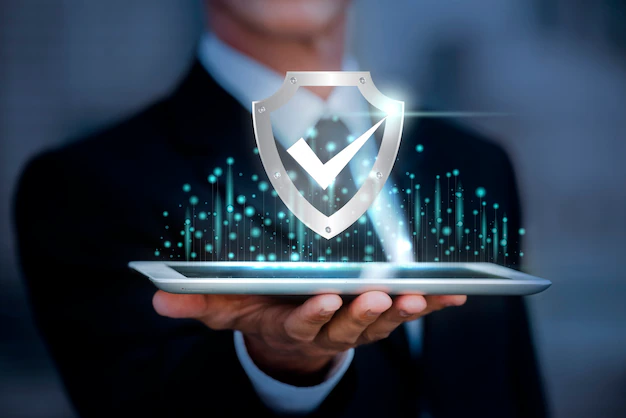Running a business is not easy. You have to deal with various challenges and risks, both online and offline. Whether it is cyberattacks, theft, vandalism, fire, natural disasters, or lawsuits, you need to protect your business from potential threats that could harm your reputation, assets, operations, or customers.
In this article, we will share some tips on how to keep your business safe both online and offline. So, keep on reading till the end to learn more…
How To Conduct Online And Offline Business Safety?
In today’s connected world, business security is physical and digital. Online and offline safety strategies ensure business continuity and employer well-being. Here, we offer a few tips on keeping businesses digitally and physically secure.
1. Antivirus And Firewall Protection
Employers must install robust antivirus and firewall software to protect their businesses from viruses, malware, and other threats. Furthermore, regular malware scans and security audits identify and resolve potential weaknesses. Visit us online to learn more about FaxBridge and its security measures.
2. Creating Secure Passwords
Password strength is one of the first lines of defense against online threats. Employers must enforce password policies that include regular updates, complexity requirements, and two-factor authentication for additional security.
3. Scheduling Software Updates
Keeping software, antivirus programs, and applications updated is essential. Software updates typically address the latest security vulnerabilities, and automatic updates provide continuous protection.
4. HR Management and Employee Training
To protect their assets, business owners must educate employees on security best practices. Social engineering and phishing attacks are commonly used by hackers and criminals. Train team members to recognize suspicious links, emails, and attachments, and remind them how important it is to report security issues promptly.
5. Encryption Of Sensitive Information
Ensure that sensitive information is protected at rest and in transit. End-to-end encryption adds a protective layer that makes it difficult for hackers to access data and use it for nefarious purposes.
6. Physical Security Procedures
Although the business world has largely gone digital, physical security is still important. Employers must implement strict security measures to protect their premises. Controlling access to sensitive areas, using surveillance systems, and investing in alarms and locks will help owners identify and patch vulnerabilities.
7. Access Control And Employee Identification
With recent increases in workplace crime, employee security has become essential. Company owners should enforce access controls within workspaces by issuing identification cards and implementing role-based access requirements. Regular reviews and updates of access permissions keep them aligned with current security and staffing requirements.
8. Safe Document Handling
Employers can protect physical documents with secure disposal, handling, and storage practices. Use locking file cabinets for confidential papers and establish procedures for the disposal of unneeded documents. These practices keep sensitive information from getting into the wrong hands.
9. Financial Security For Business Owners
Business owners can safeguard their finances by balancing their books regularly, monitoring transactions, and obtaining dual authorization for sizable purchases. Keep sensitive information confidential and ensure that it can only be accessed by authorized personnel.
10. Preparing For Online And Offline Emergencies
Emergencies and disasters can happen anytime and anywhere, and they can cause serious damage or injury to your business, employees, or customers. You should prepare for them by having a plan, a kit, and a drill. A plan is a set of instructions and procedures on what to do and who to contact in case of an emergency or a disaster.
A kit is a collection of essential items and supplies that you may need in case of an emergency or a disaster, such as a first aid kit, a flashlight, a radio, a whistle, a fire extinguisher, and water. A drill is a practice or a simulation of how to respond and evacuate in case of an emergency or a disaster.
You should also review and update your plan, kit, and drill regularly and communicate them to your employees and customers.

Bonus: Additional Business Safety Tips Both Online & Offline!
Online safety is crucial for any business that uses the internet, computers, or mobile devices. Similarly, offline safety is equally important for any business that has a physical location, such as an office, a store, a warehouse, or a factory.
Here are some safety tips you can follow both online and offline:
A. Use strong passwords And change them regularly.
Passwords are the first line of defense against hackers and unauthorized access. Make sure you use complex and unique passwords for each account and device, and change them every few months. You can also use a password manager to store and generate passwords securely.
B. Educate Your Employees And Customers.
Human error is one of the most common causes of online security breaches. You should train your employees and customers on how to recognize and avoid phishing, scams, fraud, and other online threats. You should also establish and enforce clear policies and guidelines on how to use and handle your online resources, such as passwords, devices, networks, and accounts.
C. Install Security Cameras And Alarms.
Security cameras and alarms can help you deter, detect, and record any suspicious or criminal activities, such as theft, vandalism, or trespassing. They can also alert you and the authorities in case of an emergency, such as a fire, a break-in, or a gas leak. Make sure you install your cameras and alarms in strategic and visible locations and check and maintain them regularly.
D. Insure Your Business And Assets.
Insurance is a way of transferring or sharing the risk of loss or damage to your business or assets. Insurance can help you cover the costs of repairing or replacing your property, equipment, inventory, or vehicles, as well as the costs of legal fees, medical bills, or compensation claims. You should consult with an insurance agent or broker to find the best insurance policy and coverage for your business and assets.
E. Lock And Secure Your Doors And Windows.
Doors and windows are the main entry points for intruders and burglars. You should lock and secure them with sturdy and reliable locks, bolts, bars, or shutters. You should also use keys, codes, or cards to control and limit access to your premises and keep track of who has them. You should also avoid leaving your keys or codes in obvious or accessible places, such as under a mat or in a drawer.
Bottom Line: Protect Your Business On All Fronts
Safeguarding a business from online and offline threats requires an all-encompassing approach that addresses both types of security concerns. By combining cybersecurity best practices with physical security procedures, business owners create comprehensive safety nets that protect their assets from a long list of potential threats.
When owners prioritize employee education, stay updated on the latest online threats, and invest in technologies and tools that fortify their businesses, they become more resilient against even the biggest dangers. Now more than ever, a secure company is a successful one.
Read Also:




























